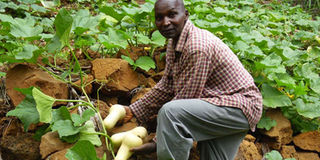Mulching sees Meru farmer reap benefits all year round

David Mugambi displays some of the butternuts that he grows with the help of mulching in Meru. Mulching insulates the soil helping to provide a buffer from heat and cold temperatures while also keeping weeds out. PHOTO | CAROLINE WAMBUI | NATION MEDIA GROUP
What you need to know:
- Mulch is simply a protective layer of a material that is spread on top of the soil.
- Mulching insulates the soil helping to provide a buffer from heat and cold temperatures and helps keep weeds out by eliminating any root competition while at the same time preventing soil compaction.
- When a farm is well mulched crops thrive as the organic matter holds the available moisture to feed the growing crops. Mulches moderate soil temperature and help in vigorous root growth
Climactic conditions in most parts Meru County generally favour agricultural activities, however, this can’t be guaranteed during the dry seasons.
And with climate change prolonging droughts, farmers need to be innovative to deal with the challenge of water shortage.
This is exactly what one couple – David Mugambi, 45, and Peninnah Kendi, 30 – who reside at the foothills of Nyambene Hills in Mikinduri, Mwiganda village, has done.
The two have proved that it is possible to cultivate crops all year round even during the dry periods.
Their two-acre farm may seem tiny but its yields stand at over four times the expected harvest, thanks to mulching.
Mulch is simply a protective layer of a material that is spread on top of the soil. Mulches can either be organic – such as grass clippings, straw, bark chips, and similar materials -- or inorganic– such as stones, brick chips, and plastic.
Mugambi better known as Bidii can be found collecting organic matter that ranges from dry leaves, twigs, wood chips and straws most of the times.
“Most people think I work as a county officer when they see me collecting the organic matter but I only started doing this when I realised that there is so much organic waste out there that I can use in my farm,” Mugambi says as he scoops some soil in his farm to show us the humus.
HOLDS THE AVAILABLE MOISTURE
Mulching insulates the soil helping to provide a buffer from heat and cold temperatures and helps keep weeds out by eliminating any root competition while at the same time preventing soil compaction.
Mugambi says he rarely weeds his farm.
Although the farm is situated on an inclined terrain the crops are arranged to not only hold the soil firmly during the rainy season but provide sufficient light for growth.
The farm which Mugambi describes as his pay slip is heaving with bananas, arrowroots, African Birdseye chilies, butter nuts cassava, some fodder and some kales. Mugambi says that he devotes all his energies to the farm.
“If I am not keen on the farming, the produce will go down affecting my earnings.”
The couple also rears chickens, goats and cows. Chickens are reared for their manure and eggs. Manure from goats and cows is also used at the farm after it has been mixed with other organic matter then allowed to decay.
“When a farm is well mulched crops thrive as the organic matter holds the available moisture to feed the growing crops. Mulches moderate soil temperature and help in vigorous root growth.” Mugambi adds that during the cold season, a well mulched farm is much warmer, and during the hot seasons, the farm is much cooler giving the crops a conducive environment for growth.
David Mugambi, a lecturer in natural resources management, at Chuka University says mulching fosters microbial activity that helps crops uptake of water and certain nutrients.





